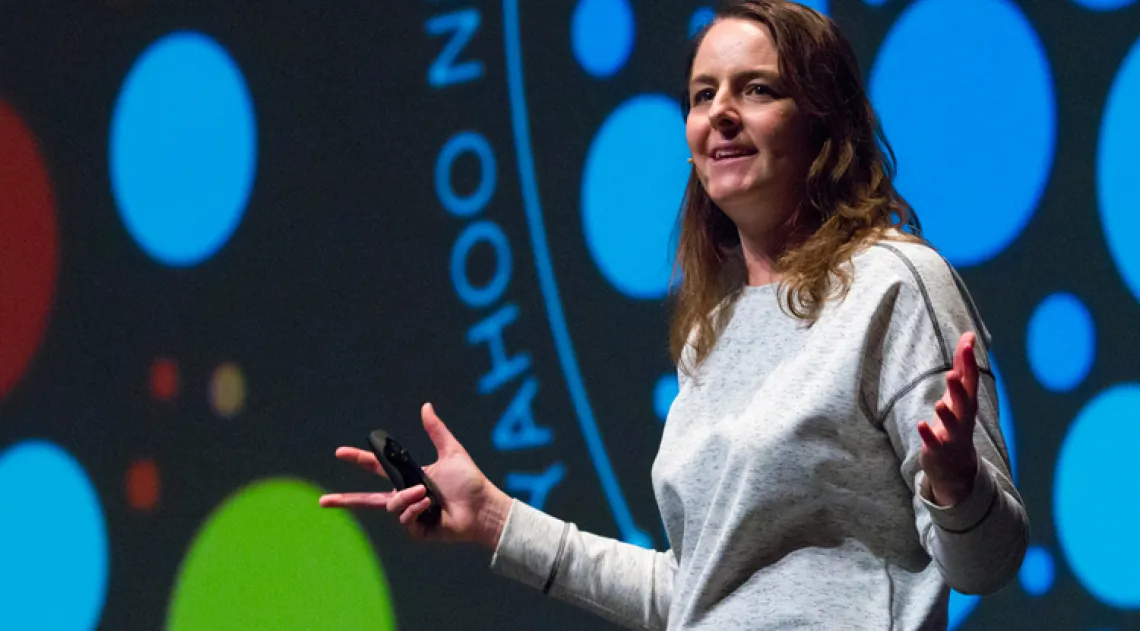The Law Professor Who’s Helping to Structure the Future of the Internet
Privacy expert Jane Bambauer is on a mission to help technology and the law advance together

The University of Arizona is building the world’s first quantum network – the next generation of internet that has the potential to radically alter nearly every aspect of our lives. And in the middle of it all is a law professor trying to make sure the new technology doesn’t create more problems than it solves.
James E. Rogers College of Law Professor Jane Bambauer is the co-deputy director of the University of Arizona’s new Center for Quantum Networks, established in August 2020 with a $26 million grant from the National Science Foundation. The University of Arizona’s core partners for the center are Harvard, MIT and Yale. It’s a bold, futuristic, interdisciplinary endeavor that will create the first network connecting multiple quantum computers to each other.
Quantum computers are vastly more powerful and efficient than any other existing technology, able to perform in mere minutes a calculation that would take today’s most sophisticated supercomputers 10,000 years to complete.
Preparing a Better Lawmaking System
So where does the law fit into this boundary-breaking scientific research?
Bambauer’s role with the center is to help ensure that the quantum network and the applications that arise from it are socially responsible.
“A project like this, where we’re creating new foundational technology that will then be a platform for all sorts of different applications, presents a good opportunity to ask, ‘Can we prepare the lawmaking system to be better?’” explains Bambauer.
Bambauer is working with School of Information Director Catherine Brooks to support social science research on the likely benefits and harms from early applications of quantum networking in order to be able to recommend public policy, educational interventions, and business practices that can help harness the good and minimize the bad.
For example, one quantum network application that scientists at the university’s Bio5 Institute are beginning to explore are quantum sensors for bioimaging purposes, like a new MRI machine that is either much smaller or much more precise than the current version. This new technology could help deliver better health care, but it may also create new challenges around privacy and data management, problems we already struggle with today. Current privacy laws and data encryption practices are probably not up to the task of protecting individuals and organizations in the era of quantum computing.
Another possible application Bambauer points to is regulations around drug development. Quantum computing may be able to help scientists develop highly customizable pharmaceuticals that would require an entirely new regulatory system other than the massive human drug trials that we rely on currently.
“A lot of our current legal and regulatory practices are in place because we always assumed that it was impossible to do something that it turns out is possible,” Bambauer says. “On the other hand, some problems we have been toiling away on may become moot as the technology advances.” The new center is supporting research by Nik Guggenberger, director of the Yale Law School’s Information Society Project, that will address these sorts of questions.
Beyond the social science research, Bambauer hopes to eventually create legal clinics where law students work with engineering and optical science graduate students to help quantum technology startups structure their new companies and manage their intellectual property with ethical and sustainable business models.
Only at the University of Arizona
Thanks to University of Arizona Law’s TechLaw Fellowship program, the nation’s only full-tuition scholarship program for law students with science and technology backgrounds, Bambauer already has access to a strong pool of students who deeply understand both law and technology.
“Our students are going to get a front-row seat to policy discussions as the people inventing the technology start to realize how it’s going to change society,” Bambauer says.
These cutting-edge, interdisciplinary research, development, teaching and learning opportunities can only be found at the University of Arizona, with the new Center for Quantum Networks bringing together the top faculty, facilities and students from the James C. Wyant College of Optical Sciences, the College of Engineering, the College of Social and Behavioral Sciences and the James E. Rogers College of Law.
“We’re the institution that has the parts, personnel, and institutional support necessary to actually make a working test bed for the quantum network,” Bambauer says. “[Center Director] Saikat Guha is the preeminent quantum information theorist, and he is really far ahead of others in terms of theorizing what quantum information could possibly do if the engineering feats are overcome.”
That forward-looking approach is a good fit for Bambauer’s cautiously optimistic perspective, and it has her already anticipating the unimaginable.
“I think I’m a good steward for the public conversations and policy debates we’re going to have over these technologies because I try to maintain some amount of realism without slipping into the pessimism that can kill a lot of useful technology,” she says. “I’m sure there is going to be a world-changing application that no one’s talking about right now, and I want to be part of seeing it come to life.”
